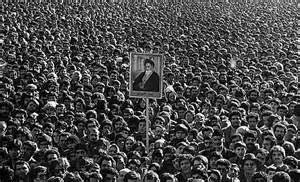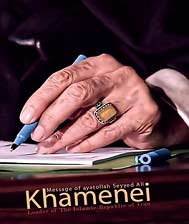The Theology of the Islamic Revolution

The Theology of the Islamic Revolution:
Morteza Agha mohammadi
There is no doubt that the revolution of the people o Iran led by the late Ayato-allah Imam Khomeini (R.A) was based on the teachings of Islam. This paper seeks to find the theological factors that are connected to this revolution, and to do so, we discuss these elements in two major categories:
First: the theology which is visible in the content and the method of the revolution that we call it the constructing theology.
Second: the theology as goal for the revolution i.e. those theological factors that the revolution and
Constructing theology of the Islamic revolution:
1- the raising of Imam Hussein (A.S) was inspiring for Imam Khomeini both in content and method.
To establish real order of Islam, fundamental changes in people's lives, to put an end to oppressions and to revive the forgotten aspects and rulings of sharia and to practice them both in individual and social aspects of the society. here politics , economy and all other organizations must be based on the Quran and the traditions and sunnah of the prophet and infallible Imams(A.S)and contrary to other Muslim thinkers of the time ,Islam is not a mere ideology just to unify people against the common enemy.
One important similarity between these two revolutions is the obedience of people to the leader (walliy), addressing his companions imam Hussein said:
I don’t know companions better than you
This important aspect also is shining in the people of Imam Khomeini; in fact we can discuss it in three parts:
The role of the Imam Khomeini:
Those people that play the role of the prophets and great leaders cannot succeed in their movements without acting and living as the prophets and even if they make people follow them a day or two, they cannot establish anything but disorder and crisis in the world.
Imam Khomeini and a new concept of revolution:
While all outstanding figures in western school of thought, believed the revolution to be rooted in things like: economic progress, class differences, governments incapability and etc. it was at this juncture that Imam Khomeini went against these prevalent dialogs in politics and he delivered a new concept of revolution. Imam differs from the common idea of revolution in both purpose and method. It's not only changing a regime but the goal is to change the way to look at the world and man and this is a real revolution and change , the same thing that the prophets wanted to do. According to the prevalent picture of revolution, there is no role for religion in those revolutions but Imam's theory of revolution is based on the religion. One of the great achievements of the revolution in Iran was the fact that we proved, religion is not a legend and it can be practiced as a road map for nations.
Another fruit of the revolution is that Imam negated the theory of separation between politics and religion, and it is wrong to think that those who are religious must stay in mosque and let the politics to be with politicians and a man of god can make a good politician at same time that he is a pious person.
Imam also was successful to show that there is no contradiction between religion and science.
He also succeeded in revival of rationalism in Iran. It was more than two centuries that enlightenment was to be translated as blind imitation of west, in such atmosphere Imam showed that we can be on our own and to have our culture and at the same time achieve real kind of progress.
Dissimulation is Haram:
At the time that majority of Olama' believed that we must practice dissimulation , Imam Cleary declared that today it is not permitted to practice this rule and must tell the truth no matter what will be the consequence. In fact he has learnt this from the school of Imam Hussein, when he was told to pay allegiance to Yazid Imam said I can't do this at all while the continuation of Islam is in danger .Imam Khomeini had this in mind and when he was asked to keep quiet and to practice dissimulation he answered today it is obligatory upon me to tell the truth, no matter what happen to me.
A. The idealistic theology of the Islamic revolution o Iran:
1-To up bring man:
Imam Khomeini explicitly declares that nothing can be harmful as non educated man and nothing can be helpful as the educated one, the bases of the world is upon upbringing man. This can be discussed in both individual and also social aspect. To train individuals in the way that Allah (S.T) wants them to be. This is something that has been neglected in the other movements while for Imam it is the corner stone.
In the social aspect it deals with making a society that pleases Allah (S.T) and the virtues and purity can be seen in all places.
2-To establish an Islamic Republic:
After the rule o f Imam Ali (A.S) there have not been any Islamic government who practices Islam, not only is governed by a Muslim. From this aspect the Islamic revolution paved the way to reach to very goal.
3- To support all oppressed ones all around the world:
According to the decrees of Shari'a the Islamic revolution feels responsible to back up oppressed people wherever they are.
4-to please people in the framework of Shari'a:
From Imam Khomeini's point of view a government which is disturbing people can't be a good example of an Islamic government since the reason behind establishing a government is to serve people not to rule over them.
5- To practice Islam and its values without giving advantage to other values over them:
Imam himself says: if I made any mistake it is upon people to inform me and they have to protest against my wrong ideas and must write against my wrong decisions.
6-to export the Islamic revolution
Imam Khomeini strongly believed that this revolution is not confined to Iran and since it is based on the teachings of Islam so like Islam itself it cannot be confined to one geographical place and is universal as the Quran itself.
In the last days of his life Imam told to the authorities in Iran:
What we have started is not limited to Iran and it is only a beginning for the universal revolution of Imam Mahdi and we have to work in a way to deliver this flag to him. Needless to say that exporting this revolution is not to be done through military actions and weapons but we want to make people familiar whit this spirituality that has taken place with our people.
7-looking for justice:
Imam Khomeini's movement is for to seek justice like the revolution of Imam Hussein. In a Zia rah of Imam Hussein we address him saying: I bear witness that you called for justice.
In a similar speech Imam Khomeini says;
Our blood is not redder than the one of Imam Hussein, why we should be afraid?
The End
Ashura
- The Third Imam, Husayn Ibn ‘Ali (as)
- A brief look at the Life of Imam Hussein
- Karbala – the Rendezvous of Faith
- In the School of Imam Husain (AS) – 2
- In the school of Imam Husain (AS) - 1
- Ziarat-e-Ashura
- The Imam Husayn's Concepts of Religion and Leadership
- Karbala and the Imam Husayn in Persian And Indo-Muslim literature
- Hazrat Zainab's(s.a) Marriage
- Hazrat Zainab (s.a.) and Imamate
- Hazrat Zainab (s.a.) in Karbala
- Who was Yazid?
- SHIMR B. ZIL JAWSHAN
- The Imam’s Brother, ‘Abbās's Martyrdom
- The Martyrdom of Abalfazl-Abbas(A)
- The short life History of Hadhrat Abbas (as)
- Titles of Hazrat Abbas (a.s.)
- The Imam’s Brother, ‘Abbās's Martyrdom
- A short biography of Hazrat Ummul-Baneen (s.a)
- The Standard Bearer of Husain
Articles
- The Actions of God
- Methods of Tabligh (propagation)
- The Signs of the Appearance (Zuhur) of the Mahdi
- Further Investigation in the Hadith-Reports
- How Will the Imam Know That the Time for the Appearance (Zuhur) Has Come?
- The Minds of the People Prepare for the Advent of the Mahdi
- The Residence of the Twelfth Imam
- The Research about Longevity
- The Sunni Books on the Characteristics of the Mahdi
- Why Did Not the Occultation Become Complete from the Beginning?
- Can a Five Year Old Boy Become an Imam?
- Who Was the Imam after Hasan Al-'Askari?
- The Unseen World and the Imam of the Age
- Mahdiism, the Jews, and the Iranians
- The Pseudo-Mahdis
- The Beginning of the Belief in the Mahdi
- Love, Sexual Discipline and Chastity. Democratic Morality, Love in Personality Growth
- Basic Need for Humane Conditioning of Natural Instincts And Desires
- A Critical Examination of The Theoretical Basis of The Proposed New Sexual Freedom
- Proposed New Sexual Freedom
Shiite Studies
- Who is a Real Shia Muslim?
- SHI'ITE RELIGIOUS THOUGHT
- Heavenly Warrant
- What does “Shi‘ah” mean?
- Why do the Shī‘ah prostrate on turbah (dried clay)?
- Is according to Islam religion separate from politics?
- What are the sources of Shī‘ī jurisprudence (fiqh)?
- Shia’ jurisprudence
- The features of Shia' ethics
- 22 Not a new lifestyle
Wahabiyat

I am a film writer writing a film presently with the aim of promoting Islamic unity and solidarity
the most visited materials
- Who Is Almighty Allah? (246641)
- Who is a Real Shia Muslim? (232574)
- Islam and Its Social System (229478)
- Brief History of Religions (228663)
- How I find that Islam does not Oppress Women? (228515)
- Islam Attacks Slavery 1 (227859)
- The Clearest Reason for Free Will (226883)
- The Advantages of Religion 1 (226339)
- Attributes of The Real Follower of Imams in Their Teachings (223171)
- Fundamental principles of Islam (222302)
- RIGHTS OF SCHOLARS (221632)
- The Rights Islam Offers to Women (220891)
- What are the differences between Shia and Sunni Muslims؟ (220071)
- Islam Various Systems (219192)
Islam Studies
- Fundamental principles of Islam (222302)
- RIGHTS OF SCHOLARS (221632)
- Islam Various Systems (219192)
- Some Hadithes on the Faith of AbuTalib (123997)
- Islam and the Genuine Needs of Every Epoch (114555)
- Islam and Racism (111777)
- Why did God locate Kaaba in a barren desert? (105339)
- Islam and Traditional Sexual Ethics (102673)
- Does Islam permit Contraception? (102410)
- Importance of Marriage in Islam (101170)
- How to ponder on the Philosophy of Islamic Laws? (92593)
- Is there any consensus on prohibition of constructing mausoleum? (91561)
Judaism،Christianity
- I attended Muslim prayers several years ago when the speaker was talking about Jesus and Islam. (69407)
- I have been fortunate in the sense that I had a Muslim father and a Christian Mother. (69137)
- Sir I was looking for some precise proof of our belief that the Bible available in the current time is corrupt, through protestant beliefs and the proofs being scientific as well. (60566)
- What does Islam say about Prophet Isa (pbuh) walking on water? (57465)
- Is it a sin reading the Bible? (56985)
- Do Christians acknowledge the Prophethood of Khidhr and recognize him officially? (56716)
- Is it true that Lady Maryam would receive food and fruit from heaven? (56011)
- In verse 55 of Aal-i Imran, God states that: (55049)
- What do Jews say about the return of Prophet Isa (pbuh) or the coming of the Promised Messiah? (54127)
























